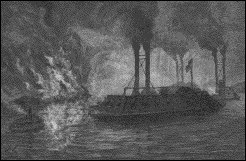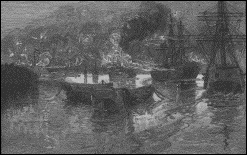CHAPTER LIV.
1. LET US make sure that we understand what had to be done to bring the seceded states back into the Union. The Confederates were powerful, brave, and confident, and their armies were commanded by skillful officers. The North greatly outnumbered them, but the Confederates were fighting on the defensive, which gave them great advantage.2. When the year 1862 opened, and the rebellion had assumed its full proportions, there were three great campaigns before the Union forces; and until they were won, the Confederacy could not be subdued. In studying these campaigns, therefore, I wish you to bear in mind what the Union armies had in view.
3. The first task was to open the Mississippi River, which the Confederates had closed by putting up strong batteries along the banks. With them they were able to sink any Union boat that might try to pass up or down the river. We shall first devote ourselves, therefore, to the study of the campaign which ended in the opening of the Mississippi.
4. You will observe the value of this river to the Confederacy. The immense supplies of beef that were brought
(195)
from Texas would be shut off if the Mississippi fell into the hands of the Unionists. A great deal of the power of the Confederacy lay in Missouri, Arkansas, Louisiana, and Texas, all of which are west of the Mississippi.5. It required a year and a half of severe fighting to open the Mississippi. The first step was the capture of Fort Henry, on the Tennessee, and Fort Donelson, on the Cumberland. The former was taken after a brief fight by the Union gun-boats, and the latter fell after a prolonged and desperate struggle. This resulted in the opening of the great river as far south as Arkansas.
6. General U. S. Grant, who commanded the department of Western Tennessee, posted himself at Shiloh, near Pittsburg Landing, and awaited re-enforcements. Before they arrived, he was attacked by a powerful Confederate army, and a desperate battle followed, lasting two days. The first day was favorable to the Confederates, but the expected Union re-enforcements arrived, and at the end of the second day's fighting the Confederates retreated toward Corinth, and Grant held the field. Island Number Ten surrendered on the same day and several thousand Confederates were taken prisoners.
7. A victory of the Union gun-boats over the Confederate iron-clads, on the Mississippi, resulted in opening the river to Vicksburg. At this point took place the final struggle for the possession of the mighty stream, so important both to Confederates and Unionists.
8. Before the Mississippi was opened, other movements were made, to which we must give attention. The Confederates, with a large army under Bragg, invaded Kentucky. They, and the Unionists under Buell, it may be
said, ran a race for Louisville. Buell reached the city a few hours in advance of Bragg, who gave up his purpose of invading the North.9. The result of the campaign in Kentucky did not satisfy either government. The Confederacy ordered Bragg

Fight between Union Gun-boats and Confederate Iron-clads.
to finish his work, while Buell was superseded by Rosecrans. The two armies met at Murfreesborough, Tennessee, on the last day of 1862, and opened one of the most furious conflicts of the war. It was suspended on New Year's day, but ended the following day, when Bragg retreated.
10. The attempt to open the Mississippi was not confined to the upper portion of the river. Captain Farragut,
with a fleet of armed steamers and mortar-boats, and with the assistance of a land force, undertook the capture of New Orleans. Unable to reduce the forts below the city by bombardment, Farragut steamed up the river, destroying twelve out of thirteen of the Confederate armed steamers. The city was helpless, and the army took military possession of New Orleans. Farragut continued up the river, captured Baton Rouge (bat-un-roozh') and Natchez, and running past the guns of Vicksburg, joined the Union fleet above. (April 1862)11. This left only two posts on the Mississippi, Vicksburg and Port Hudson, in the hands of the Confederates. They held out bravely, suffering with hunger, and worn out by night and day work in the trenches, until, at the end of forty-seven days, the Confederate com- (July 4, 1863)
mender at Vicksburg surrendered. The surrender included an army of over thirty thousand men and one hundred and seventy-two cannon. Port Hudson yielded several days later, and thus the Mississippi, from its source to the Gulf of Mexico, came into the possession of the Unionists, and the Confederacy was cut in twain.QUESTIONS 1. Compare the North and South at the beginning of the war. --2. What were necessary before the rebellion could be subdued? --3. What was the first task? What had the Confederates done? --4. Show the value of the Mississippi to the Confederacy. --5. How long did it require to open the Mississippi? What was the first step taken? In what did these successes result?
6. Give an account of the battle of Shiloh. --7. What was the result of a victory of the Union gun-boats on the Mississippi? --8. Give a history of the Confederate invasion of Kentucky. --9. What is said of the result of the campaign? What was done? What of the battle of Murfreesborough? --10. Give a history of the capture of New Orleans. What was done by Farragut after the fall of New Orleans? 11. How many posts on the Mississippi remained in the hands of the Confederates ? Give the facts connected with their fall.
 |
 |
 |
© 1998, 1999, 2000, 2001 for the NEGenWeb Project by Ted & Carole Miller
